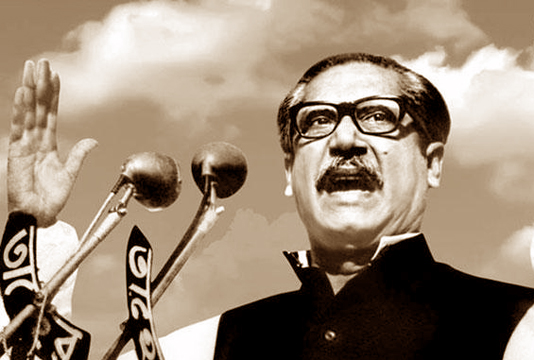By Maloy Kumar Dutta
DHAKA, Mar 06, 2020 (BSS) – The nation was kept in dark about Bangabandhu’s landmark 7th March speech for long 21 years after his brutal assassination on August 15, 1975.
During the post-Bangabandhu era, the youths neither had any idea about the speech nor the great leader, who led the nation to its struggle for independence from the subjugation of Pakistani suppressors.
“After the assassination of Bangabandhu, the youths who were able to watch television or listen to radio were kept in dark about the speech till June 23, 1996. People started to listen the historic speech after her illustrious daughter Awami League President Sheikh Hasina had formed the government through the 1996 general election,” former Dhaka University Vice-Chancellor and noted communicologist Professor AAMS Arefin Siddique told BSS in an interview today.
He said the audio-visual record of his landmark speech was not disseminated or broadcast through any kind of medium until June 23, 1996.
Prof Arefin said during that period, only Awami League grassroots leaders and workers played the audio record of the speech on Bangabandhu on his martyrdom or birth anniversaries.
On June 23 in 1996 just after Bangabandhu’s daughter Sheikh Hasina took oath at the Bangabhaban, the state-run Bangladesh Television first telecast Bangabandhu’s speech in the evening, he added.
After watching the recorded speech at the television, Prof Arefin, a teacher of DU Mass Communication and Journalism Department, said young students of the university told him and he also came to know from the students of other universities that the youths never thought that they had such a great leader.
“They might have listened to the audio record of the speech. But for the first time, the greatness of Bangabandhu and his leadership, his personality and bravery were portrayed to the young generation when they watched the audio-visual presentation of the speech,” he said.
The communication expert said watching the video record for the first time, the youths observed Bangabandhu’s body language, gesture and posture, wordings, and style of speaking in the fiery speech at the then Race Course Maidan.
“Before the day, they did not get any opportunity to watch the speech. After suddenly watching the speech, a reaction was created among them,” he observed.
Prof Arefin said the purpose of keeping the speech concealed was to hide the strength of the speech that encouraged the freedom-loving Bangalees in the long nine-month battle against the Pakistani occupation forces.
“In the nine-month Liberation War, Bangabandhu was in a Pakistani jail, but his speech was with us. And it seemed that Bangabandhu was with us. In the battle field, the freedom fighters fought the war being inspired by the speech,” he said, adding that during the war, the people listened to the speech through the Swadhin Bangla Betar Kendro.
The former DU VC said the perpetrators and assassins of Bangabandhu were frightened at the speech realising its immense strength.
“So, I believe, it is a must to present the speech before the new generation again and again. This speech should be included in textbooks and this should be taught in classrooms,” he suggested.
Prof Arefin said: “If that could be done, Bangabandhu’s philosophy and personality could be disseminated before the youth generations after generations.”
The communicologist said the speech itself is a great textbook and there is the necessity to teach this textbook to youths.
The UNESCO has realised this thing and that is why it has included the speech in the Memory of the World International Register, a list of world’s important documentary heritage maintained by the UN organisation, he added.
“The human civilization has come to the current form after passing thousands of years. Many human beings have contributions to bring the civilization to its modern form,” he said.
Bangabandhu Sheikh Mujibur Rahman’s speech has a huge role in the emancipation of the deprived, distressed, persecuted and repressed people, he added.
Prof Arefin said the last words of this speech were “Ebarer sangram amader muktir sangram, ebarer sangram swadhinatar sangram [The struggle this time is a struggle for emancipation, the struggle this time is a struggle for independence]”.
He said this struggle for emancipation was struggle for absolute freedom from all kinds of repression for the human civilization.
Prof Arefin said the significance of this speech even now in 2020 is as important and relevant as it was in 1971 and even it will remain same on March 7 in 2050, when Bangalees will observe the day.
“The speech was part of Bangabandhu’s philosophy. In his addresses at different international programmes as head of the government and the state after the independence, Bangabandhu used to tell that the ‘entire world is now divided into two halves. One part is the repressed and other is the repressors. I am for the repressed people’,” he said
Bangabandhu had fought for emancipation of repressed human beings till his martyrdom, he said.
The communicologist said: “If we make psychological analysis of the speech, we find the extempore speech reflected words from his hearts in a very simple way.”
“So, it could be called conversation not speech. As he made the address before the nation in a conversational style as if he is talking with the people,” he added.



